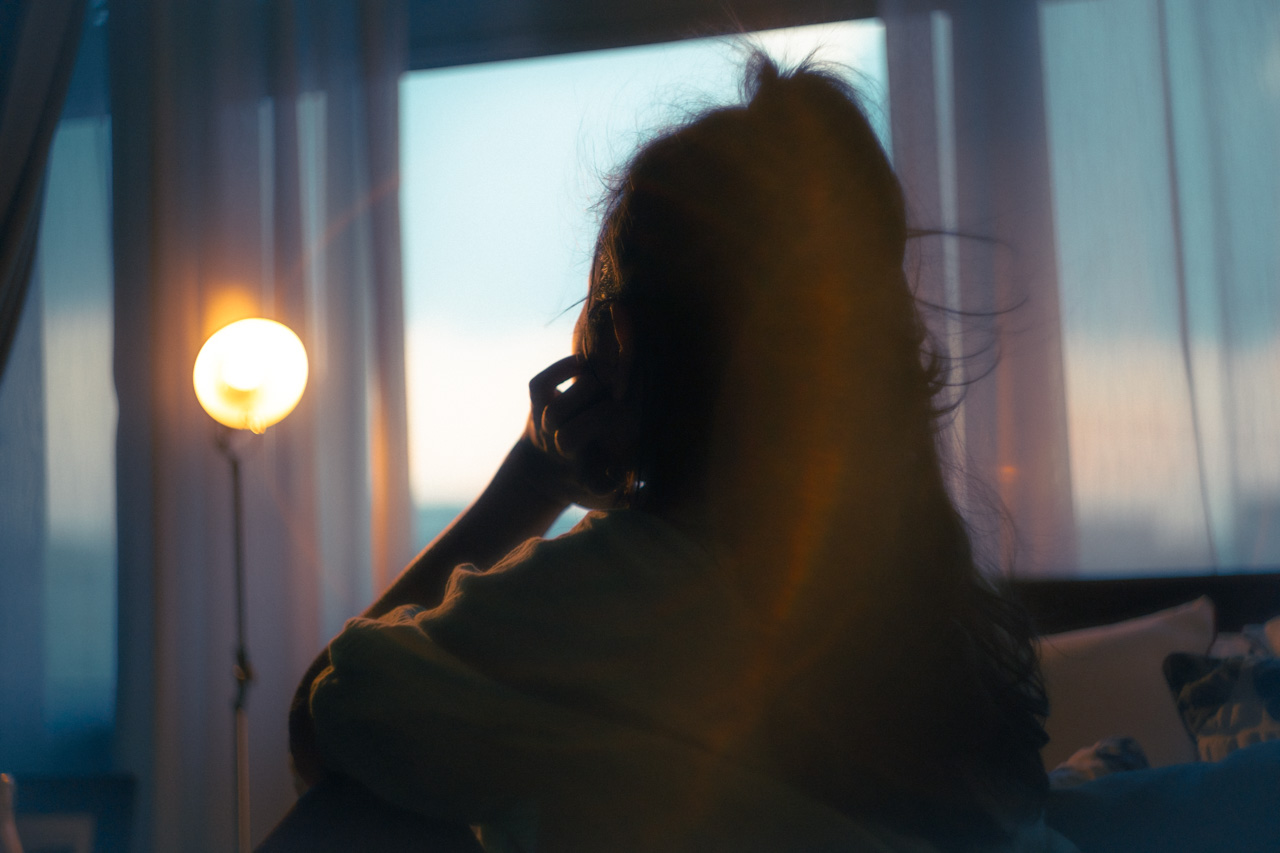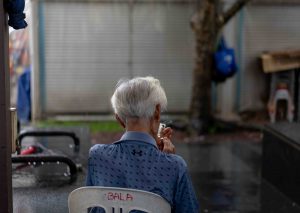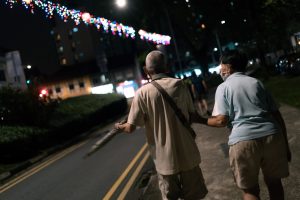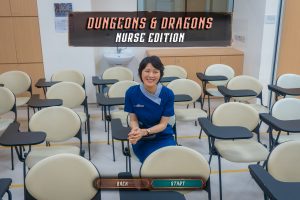All images by Stephanie Lee for RICE Media.
When my dad had a second stroke not long after his first, my family’s daily lives took a sharp turn. As I made the now-familiar commute to the National University Hospital, it hit me: this new unease had become embedded into my night routine.
I found myself longing for the quiet comfort of what once was. Those simple, ordinary moments—having dinner with Dad after a long day, sharing stories about our day before retreating to the solace of our rooms—suddenly felt like treasures I didn’t appreciate enough.
Returning to normalcy seems like an impossible task, and I can’t help but wonder: how do others who’ve faced such life-altering events find their way back? How do they rebuild their lives when the ground beneath them has shifted so dramatically?
As fate would have it, I connected with Yan Ong, 68, founder of the Fashion For Cancer (FFC) initiative. She introduced me to a group of cancer survivors—the very people who’ve had to pick up the pieces after their lives were shattered by such a cruel twist of fate.
As I got to know their stories, I began to understand that healing isn’t about returning to what was; it’s about embracing what is. And in that acceptance, find the courage to craft a new normal.
As the world slows and the day’s chaos fades, the evening rituals they create become quiet acts of resilience, anchoring them in the present and fortifying them for a future once uncertain. In the stillness that comes after sunset, what are the gentle moments that give these cancer survivors peace at night?
Each ritual is a reminder of the battles they’ve fought, the uncertainties they’ve faced, and the strength they’ve discovered within themselves. I followed each of them through their nightly routines in hopes of finding solace in their stories.
6:59 PM / Sunset State of Mind
The corridor of Shamen Yee’s HDB unit in Pasir Ris is adorned with a wide variety of potted plants—plants that gave her joy in the act of nurturing after her cancer treatment. Her home is furnished with wooden furniture and sprinkled with personal trinkets, much like her personality: warm and cosy.
“I prefer sunsets instead of sunrises because it’s a reward after a hard day. It’s time to take stock and let the day go,” the 47-year-old reflects as we watch the sunset from the best spot in her home—the bedroom. There’s an immediate sense of peace as we watch the sun fade into the horizon. I understand why she builds this into her regular wind-down routine.
As dusk fades, I follow Shamen into the kitchen, where she starts preparing dinner for her husband, Chris. Pasta alla norma is on the menu tonight.
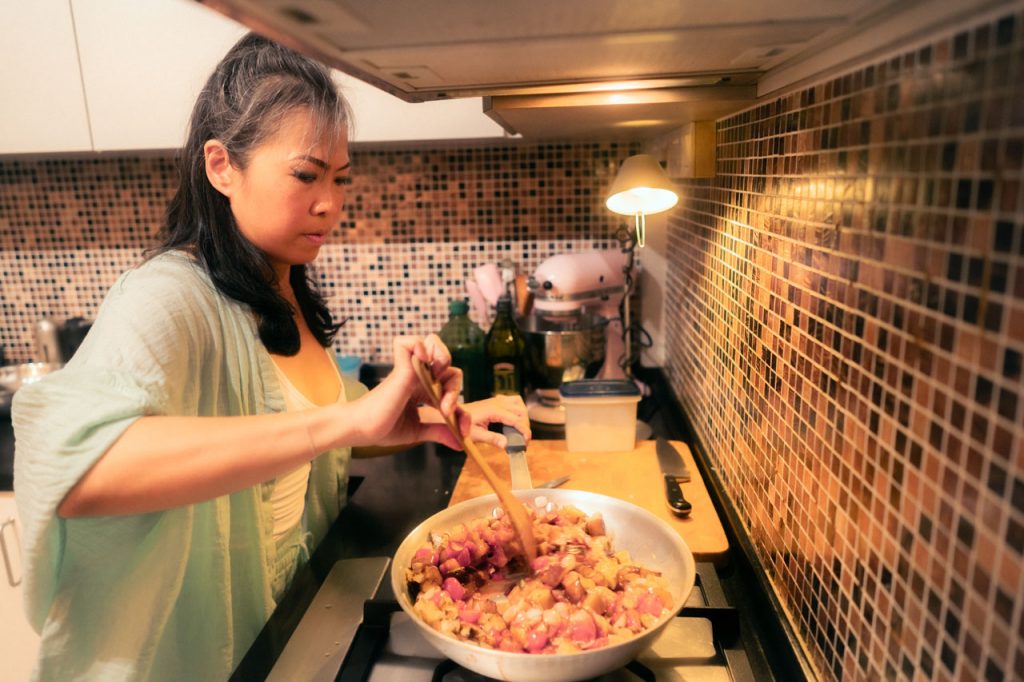
Shamen gets into her zone. On one end of the kitchen counter, she chops garlic, onions, and eggplants while stir-frying tomato sauce and pasta on the other.
These seemingly simple actions posed significant challenges for her during her breast cancer treatment, which involved 16 sessions of chemotherapy, 20 sessions of radiotherapy, 18 sessions of immunotherapy, and a lumpectomy surgery.
“Cooking is my love language. It’s my way of showing those who matter how much I care. When I could finally cook an entire meal without feeling that I was going to keel over and die, it was a big accomplishment for me.”
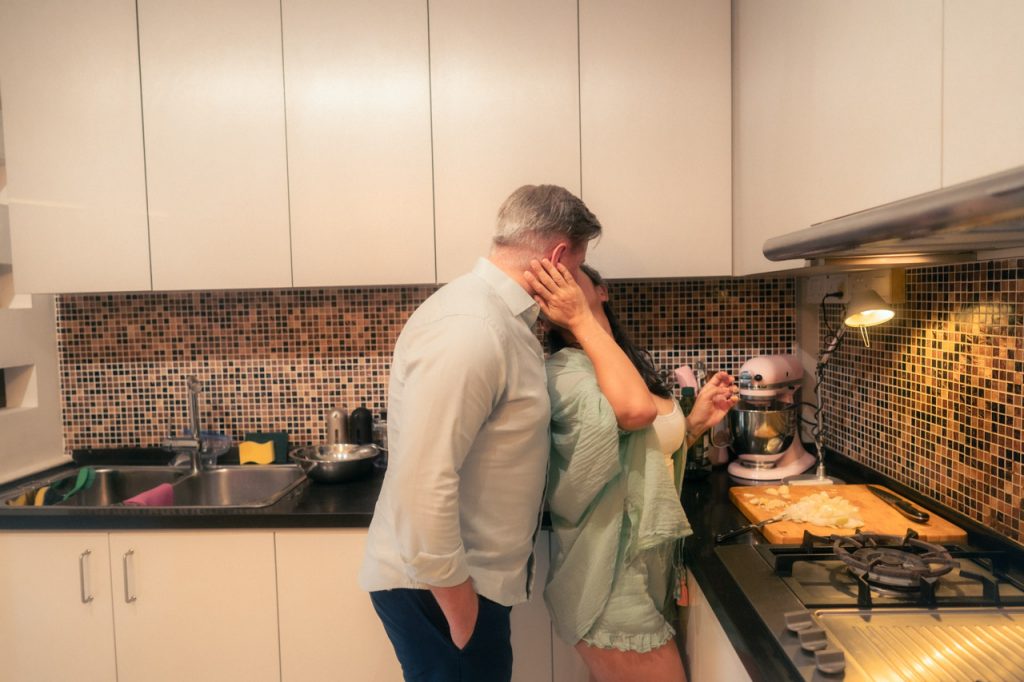
Shamen recounts how the treatment took a toll on her body back in 2021. Other than losing the ability to cook, she took time away from her career as a personal assistant to the CEO of a private bank. She eventually left her job in 2022.
“I forget words and couldn’t really converse. My fingers were always in pain that I couldn’t even button my blouse,” she recalls. “I was angry, I was lost, and I felt shitty about myself.”
Understandably, Shamen was wrecked by the loss of purpose in those trying years. As the eldest child in her family, she had to support her parents and put her younger brother through school. She had never been without a job since she was 19.
7:03 PM / Dog Day Evening
I catch up with Deborah during her daily evening walk with her dogs, Pumba and Roxy.
“Oh yes, Roxy brings this chewing ring during our evening walks and refuses to let go of it,” Deborah chuckles as she shares with me her dogs’ little quirks. “Pumba will eat anything off the ground.”
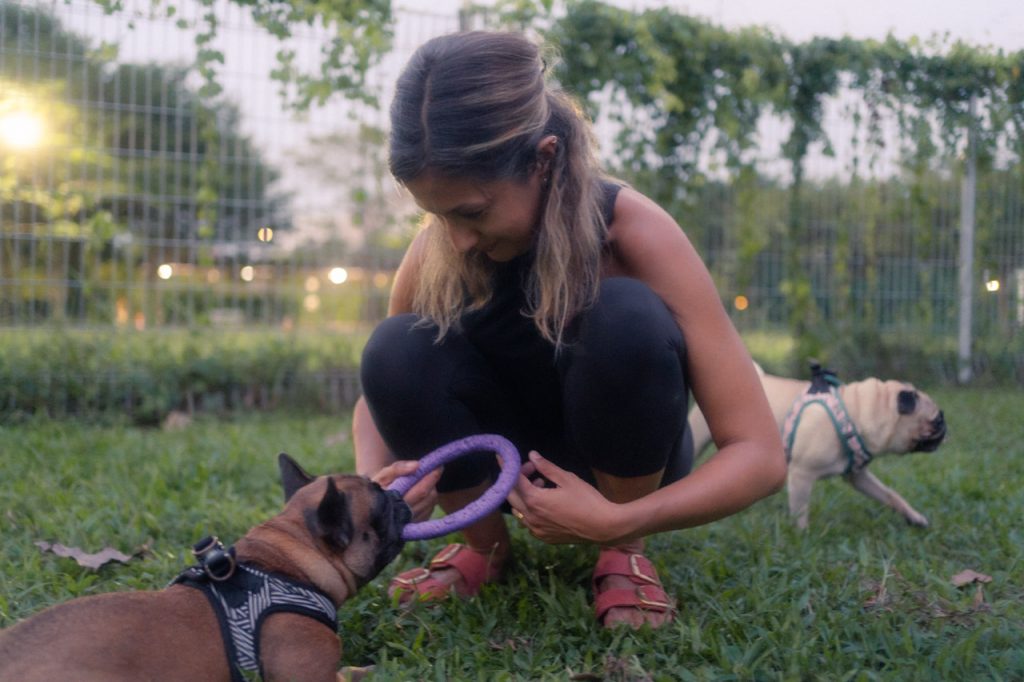
Deborah Roques, 38, recently left her job as a bid manager in the aerospace industry despite the unwavering support her company provided during her cancer journey.
“I stayed at my job because it was comfortable, but I couldn’t shake the feeling that there’s more to life than sitting in front of a laptop,” she explains.
This sense of restlessness wasn’t new to Deborah. From a young age, she had always dreamed of exploring the world and living overseas—a dream that led her to move from France to Singapore 13 years ago.
But her life took a sudden turn just four years after migrating here when she was diagnosed with breast cancer at the age of 29.
“It was a shock because I was young, healthy, and always mindful of my diet. There was no history of breast cancer in my family,” she recalls.
While her flatmate—whom she considers a second sister—was incredibly supportive and went with her to every medical appointment, Deborah longed to be with her parents and sister. So, her mum flew to Singapore to accompany her back to France for chemotherapy and post-mastectomy care.
Her treatment in France went smoothly, but she knew her life was in Singapore. After nearly a year in France, she returned.
7:15 PM / Dine
“Would you like to join us for dinner?” Prem Kallat asks as he sets the dinner table in his home in Hougang. With his towering build, fit physique, and charming smile, you’d never suspect he’d undergone total stomach removal.
“I think a lot of people don’t know that you can survive without a stomach,” the 64-year-old father of two laughs as he speaks about his stomach cancer diagnosis in 2017.
Life hasn’t changed drastically for him after his stomach removal. “I just have to be careful how much I eat but I can eat almost anything. And I take some enzymes.”
The dinner table is laid out with takeout ordered by Prem’s wife, Dorothy Yeo, 55: fried rice, chicken wings, black pepper sliced fish, salted egg sotong, kailan, beancurd fried pork, and minced meat tofu. It’s an impressive spread, but Prem could only take small portions of the dishes, which he had to chew on for some time before swallowing.
“It’s a little troublesome, but the alternative is death,” he ponders. “I think it’s worthwhile.”
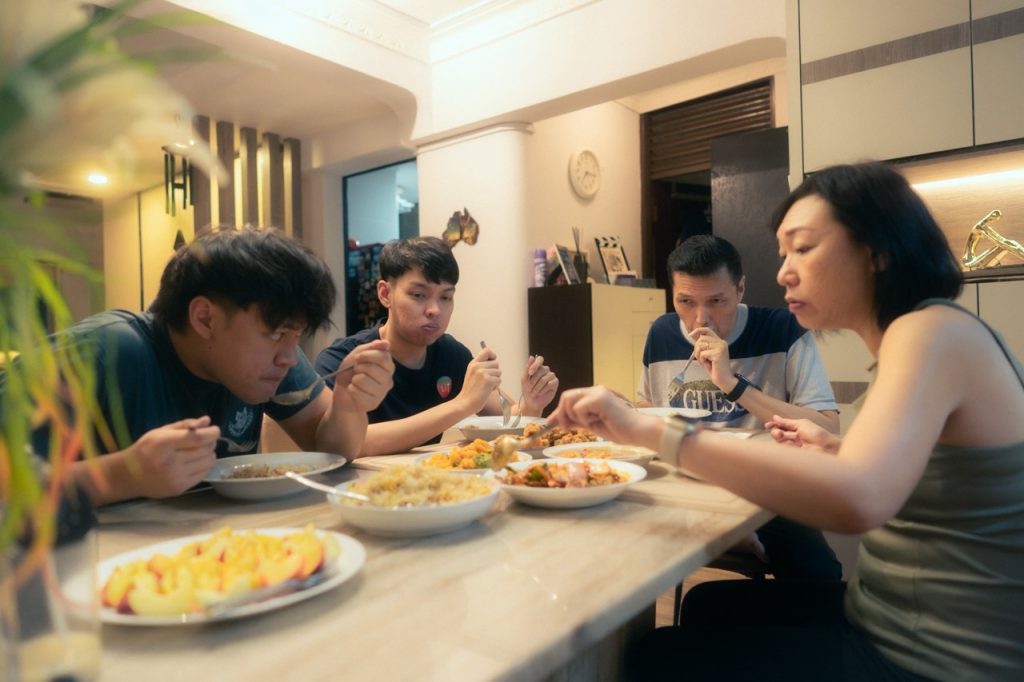
“How did you feel when you first got diagnosed? You seem very cheerful for someone who lost his stomach,” I remark.
“I was very positive, I think that’s critical for anyone going through chemo. I am a Christian, so I have our faith to follow. I wasn’t afraid of death. I was more scared of who I’d be leaving behind: My children, my wife, and anyone who loves me.”
Prem tells me that his children cried when he first told them the news. It hit him right there and then he couldn’t bear to leave them behind.
“I reassured them that I was going to fight.”
Prem takes time to catch up with his sons, Shane, 25 and Ian, 26.
Likewise, 40-year-old Christopher Lek spends time with his parents through dinner. He visits them about three times a week—and even though they don’t interact much while he’s there, he finds it important to simply be around for them. Especially after he was diagnosed with leukaemia in 2022.
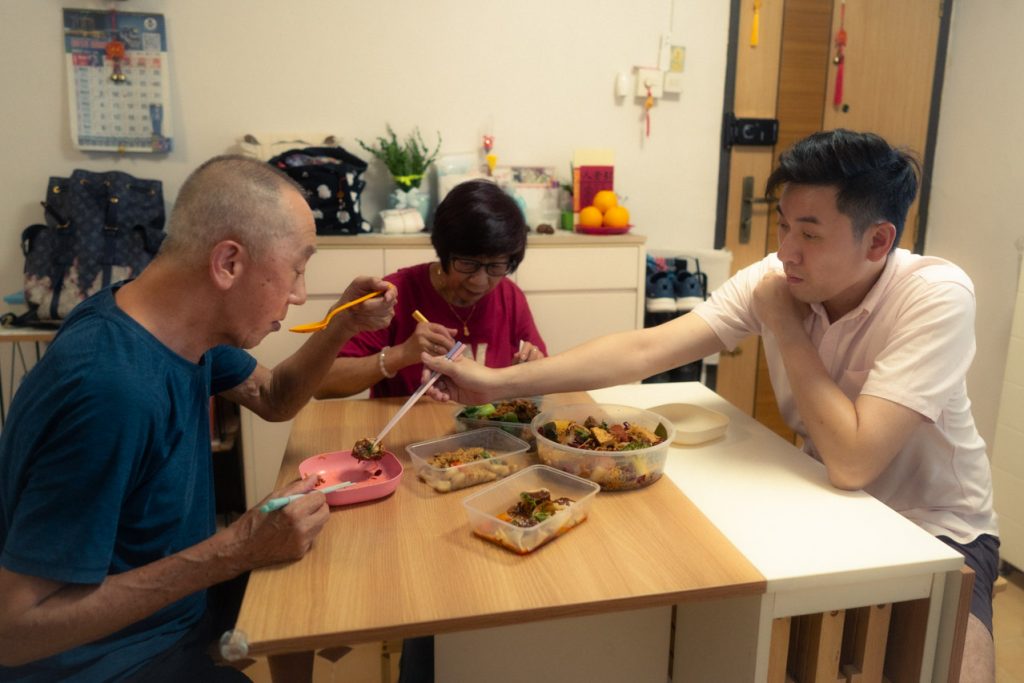
Outside of home, Christopher is not content to be simply sitting around. Despite his brush with cancer, he remains outgoing and thrives on the adrenaline from driving, go-carting, and cycling. He went right back to his thrill-seeking ways after he went into remission in 2023.
While photographing him, Christopher shows me a scar from his recent accident—a bad shoulder fracture acquired from mountain carting in New Zealand. He had a major operation which involved inserting nine screws and a metal plate in his left arm.
He wonders if it’s the universe’s way of telling him to slow down.
8:11 PM / Cuddle Time
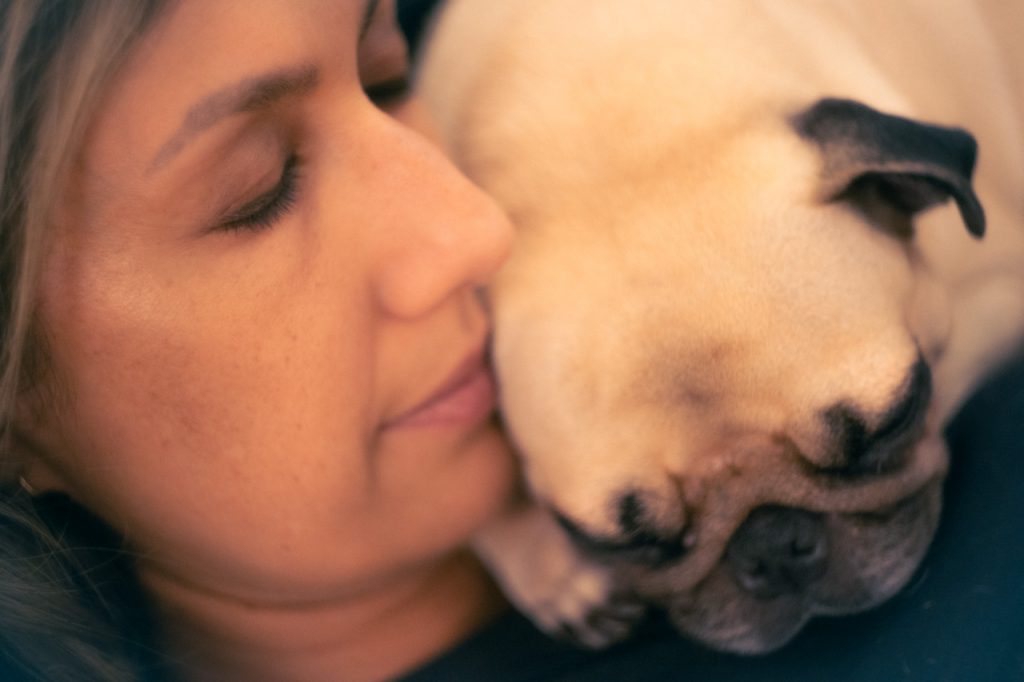
Pumba played a significant role in calming Deborah during her darkest moments. Deborah had a relapse in 2019, and with it, the bombshell news of having only two years left to live. It sent her through a series of panic attacks.
“It’s crazy how much a dog can teach you,” she recounts when she and her husband, Gregg, 44 first got Pumba a few months after her diagnosis.
“She has a habit of laying down on my chest when she sleeps, and I can feel her breathing. Her weight on my chest helps to regulate my breathing and reminds me to stay in the present.”

Thankfully, she found a treatment that worked. Deborah tried induced menopause at first, but her body started to react negatively to the injections. She finally decided to remove her ovaries. I can only imagine how tough it was for Deborah to make that decision, especially when she speaks so fondly of her nephew and stepdaughters.
“It’s a complex process to reach that decision. Even if I was not sure if I wanted a kid or not, it’s always reassuring to have the option, and it’s tricky when it’s taken from us.”
Deborah has made peace with this decision and is considering adoption down the road. Besides, she has so much love for Pumba and Roxy that her husband even jokes about them being their children.
8:43 PM / The Show Must Go On
Prem and Dorothy have been married for 30 years. Despite their contrasting tastes—she loves Korean dramas while he prefers English rom-coms—watching TV together each night is their favourite way to unwind and have quality time as a couple.
Tonight, they settle on a Netflix thriller: Beast.
Prem guarantees their relationship is as solid as cement. “It’s nothing spectacular, just a foundation that gets stronger as we go through life experiences,” he says.
I soon understood why—they had each taken turns caring for the other during their separate battles with cancer. When Dorothy was first diagnosed with breast cancer in 2009, Prem stepped up, managing the household and caring for their children while also tending to her needs.
Years later, the roles reversed when Prem was diagnosed with stomach cancer. Dorothy devoted herself entirely to his physical and spiritual well-being.
But their fight with cancer isn’t over. Dorothy relapsed soon after and now faces a lifetime of medication. Yet, through it all, Prem remains resilient. “It’s still better than facing all three battles at once.”
8:59 PM / Sense of Urgency
“People say I’m a workaholic, but this aspect of me saves me from my diagnosis,” Christopher quips. As a financial advisor, he recalls working on insurance claims while receiving treatment and occasionally taking video calls in the hospital.
The irony wasn’t lost on him when he had to carry out his own personal insurance claims. He cheekily remarks that the only claim he can’t do for himself is the death claim.
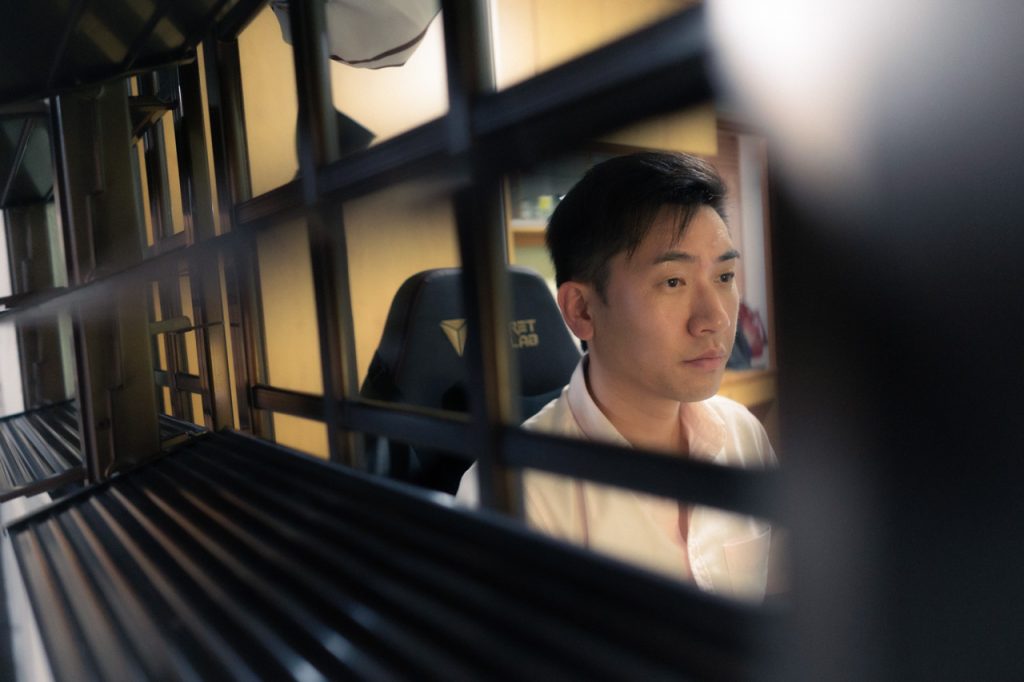
Christopher’s mantra throughout his cancer journey: “Don’t ask questions that you cannot answer”. Work prevented him from spiralling into the whys and hows.
“I was also more self-centred and had neglected the people around me,” he says, reflecting on his personality before his cancer diagnosis. He admits that he still complains about traits that trigger him, but he has learned to be appreciative of his parents and his son.
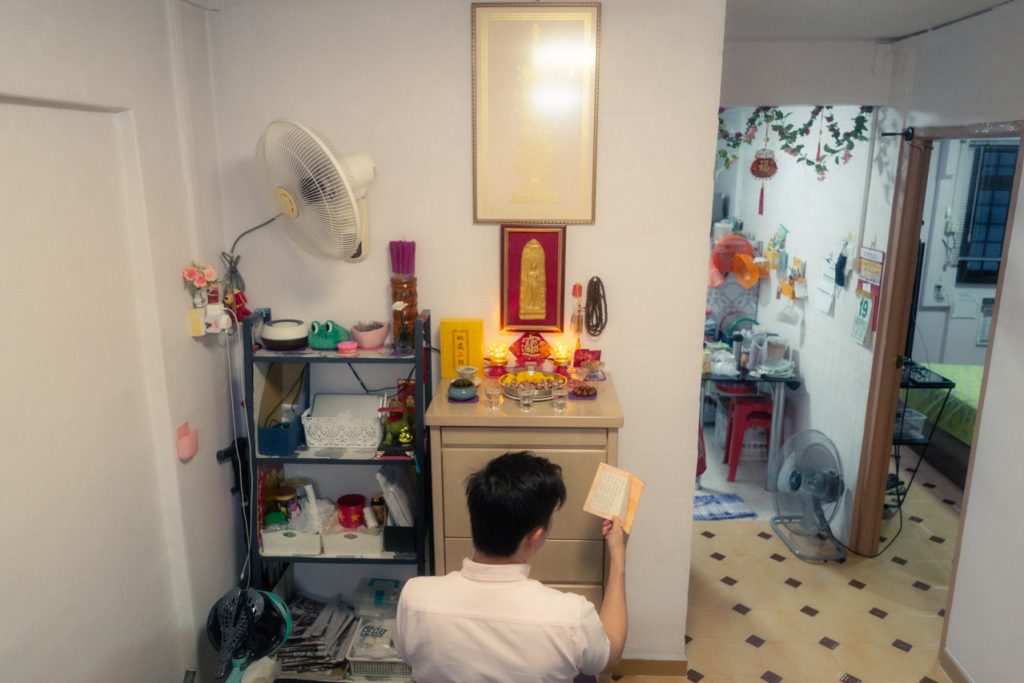
9:23 PM / Tuning In
Back in Shamen’s household, there’s always music playing in the background. For our interview, she puts on Sade.
As ‘Your Love is King’ crackles in the air, the mood turns serious when we speak about her son being forced to grow up before his time because of her illness. There were times when she couldn’t be the mother she had hoped to be for her son, Tristan, when he was 16.
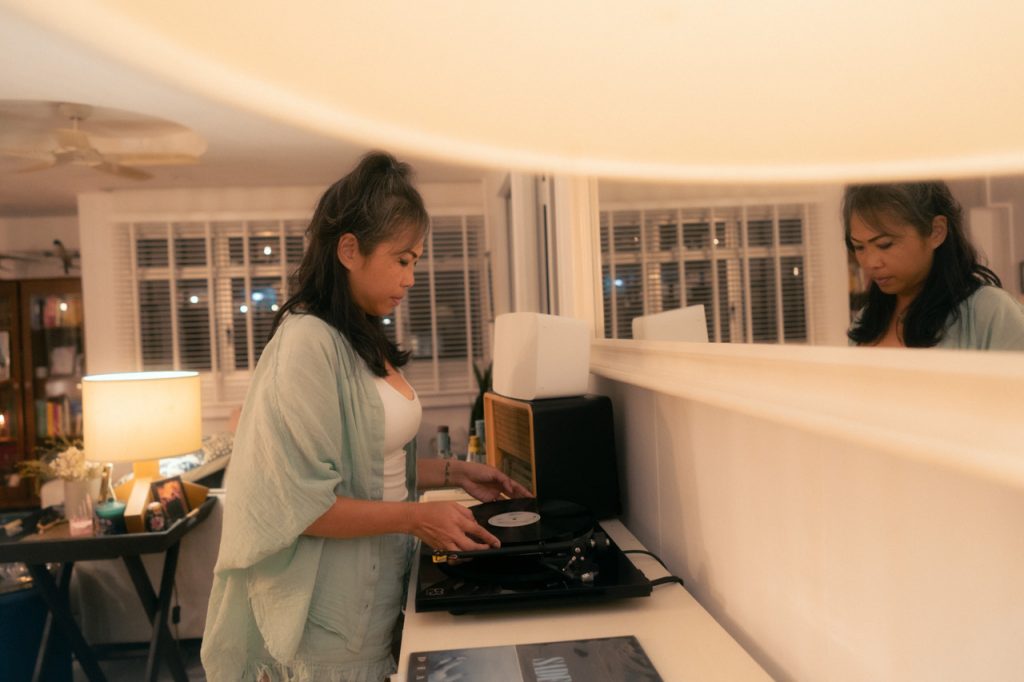
She recalls a painful memory when she reprimanded her son for not bringing chicken rice to her when she was having a rough day during treatment and couldn’t get out of bed. Tristan kept quiet, but since that incident, he has attentively prepared cutlery for Shamen whenever he buys food for her.
“There’s a degree of guilt. I wanted him to be able to take care of me, but I shouldn’t have these expectations of him.”
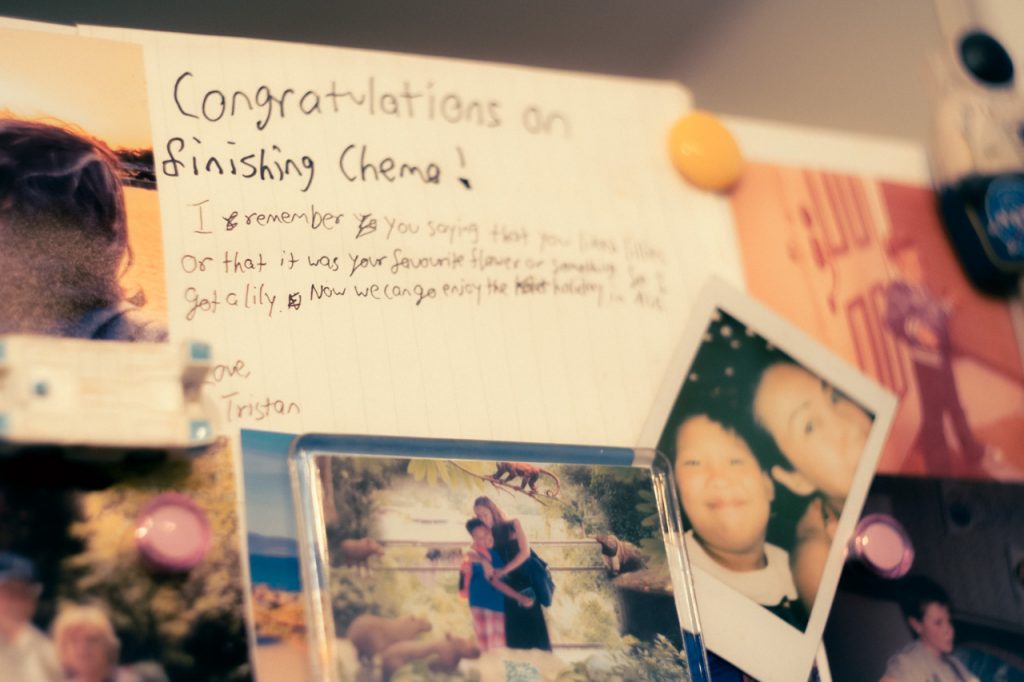
Good Night, Good Luck
Throughout each visit, I grew to cherish life’s subtleties more deeply. Simple pleasures like a conversation or a shared meal with loved ones, once overlooked, now hold a special place in my heart.
I pose the final question to each of the interviewees: “What gets you out of bed in the morning?”
Prem replies without a second thought. “Family, of course.”
Though semi-retired, he still enjoys going to work, feeling lucky to have a great boss and supportive colleagues. On his off days, he looks forward to playing squash with his sister or going for solo cycling rides.
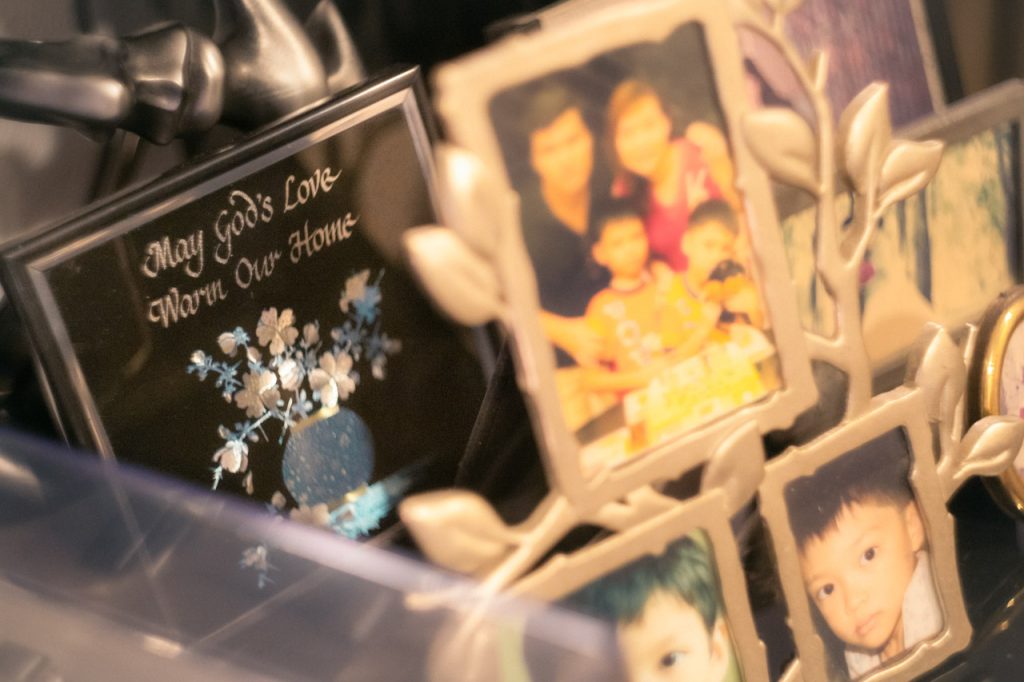
Shamen, on the other hand, hates the morning and lies in bed for half an hour, contemplating her life before she gets up. These days, she’s thriving—she’s building her own brand of sourdough crackers; she attended a course in prompt engineering; she even volunteers to manage FFC’s social media accounts.
“I’m 47. Fuck. I’m not at that age where I could be doing social media,” she lets off a big laugh.
And yet, she does. She plans, shoots, edits and posts social media content for FFC. And things have gotten busier for Shamen with FFC’s Charity Fashion Show 2024 happening on August 31, where the four of them and other cancer survivors will be walking down the runway to raise funds for cancer research and financial aid support.
“I feel good that I could do it; it’s not all dead in here,” she gestures to her head. “‘Chemo brain’ did not take the best of me. Something is still alive. I am still capable of doing things.”
Christopher isn’t a morning person either. “If I were born into a rich family, I would be a bum and lie in bed all day,” he jokes. On a serious note, he tells me that he has been going to therapy because he has been feeling lost in life.
He’s searching for an answer to the question that stumps the best of us: What truly makes you happy?
For Deborah, the answer is straightforward.
“I am just glad to be able to wake up, be healthy and stand up on my own. I am so grateful.”



